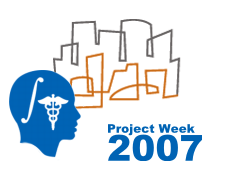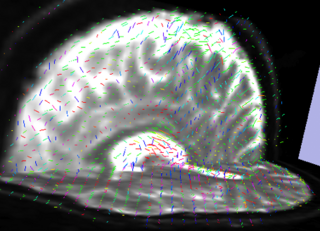Difference between revisions of "Collaboration/MCIC/DTI:mgh60direction"
From NAMIC Wiki
Hjbockholt (talk | contribs) |
Hjbockholt (talk | contribs) |
||
| (5 intermediate revisions by the same user not shown) | |||
| Line 1: | Line 1: | ||
{| | {| | ||
|[[Image:ProjectWeek-2007.png|thumb|320px|Return to [[2007_Programming/Project_Week_MIT|Project Week Main Page]] ]] | |[[Image:ProjectWeek-2007.png|thumb|320px|Return to [[2007_Programming/Project_Week_MIT|Project Week Main Page]] ]] | ||
| − | | | + | |[[Image:60dirsequence_glyphs.png|thumb|320px]] |
| | | | ||
|} | |} | ||
| Line 19: | Line 19: | ||
<h1>Objective</h1> | <h1>Objective</h1> | ||
| − | We are | + | We are interested for further methods for analyzing diffusion tensor data. We currently use V. Magnotta GTRACT tools, but wish to come up to speed on additional methods and tools in the NA-MIC kit. The MCIC project has approximately 300 schizophrenic patients and matched healthy volunteers collected at 4 sites for which we can potentially apply NA-MIC kit tools. |
</div> | </div> | ||
| Line 27: | Line 27: | ||
<h1>Approach, Plan</h1> | <h1>Approach, Plan</h1> | ||
| − | Our approach for analyzing diffusion tensors is | + | Our approach for analyzing diffusion tensors is use documentation on existing tools once our data is converted to NRRD format. |
Our plan for the project week is to first try out <bar>,... | Our plan for the project week is to first try out <bar>,... | ||
| Line 37: | Line 37: | ||
*We have an anonymized dicom mosaic format MGH 60 direction test data set with us. | *We have an anonymized dicom mosaic format MGH 60 direction test data set with us. | ||
| − | *Sumner | + | *Sumner worked on the Slicer2.7 DTI NRRD to DICOM and DTI processing tutorials. |
| − | * | + | *Sumner worked with Raul to convert the MGH 60 direction mosaic format into NRRD format |
| − | + | **The mosaic format is somewhat difficult to convert into NRRD format | |
| − | + | *Sumner modified an example demosaic script provided by Raul and wrote a perl script to automate this conversion. | |
| + | *We worked with Vince Magnotta on further integration efforts between GTRACT and Freesurfer efforts which will provide a tool for regional summary of DTI scalars based on a talairach parcellation of white matter using Freesurfer segmentation. | ||
| + | *'''Future Work''' | ||
| + | ** Sumner will continue to work through the Slicer2.7 DTI tutorial on the NRRD version of the MGH 60 direction format, our intention is to apply the tools to a sample of 300 schizophrenic subjects in the MCIC project | ||
</div> | </div> | ||
Latest revision as of 13:26, 29 June 2007
Home < Collaboration < MCIC < DTI:mgh60direction Return to Project Week Main Page |
Key Investigators
- MIND: Jeremy Bockholt, Sumner Williams
- MGH: Bruce Fischl
- Utah: Tom Fletcher
- Iowa: Vincent Magnotta
Objective
We are interested for further methods for analyzing diffusion tensor data. We currently use V. Magnotta GTRACT tools, but wish to come up to speed on additional methods and tools in the NA-MIC kit. The MCIC project has approximately 300 schizophrenic patients and matched healthy volunteers collected at 4 sites for which we can potentially apply NA-MIC kit tools.
Approach, Plan
Our approach for analyzing diffusion tensors is use documentation on existing tools once our data is converted to NRRD format.
Our plan for the project week is to first try out <bar>,...
Progress
- We have an anonymized dicom mosaic format MGH 60 direction test data set with us.
- Sumner worked on the Slicer2.7 DTI NRRD to DICOM and DTI processing tutorials.
- Sumner worked with Raul to convert the MGH 60 direction mosaic format into NRRD format
- The mosaic format is somewhat difficult to convert into NRRD format
- Sumner modified an example demosaic script provided by Raul and wrote a perl script to automate this conversion.
- We worked with Vince Magnotta on further integration efforts between GTRACT and Freesurfer efforts which will provide a tool for regional summary of DTI scalars based on a talairach parcellation of white matter using Freesurfer segmentation.
- Future Work
- Sumner will continue to work through the Slicer2.7 DTI tutorial on the NRRD version of the MGH 60 direction format, our intention is to apply the tools to a sample of 300 schizophrenic subjects in the MCIC project
